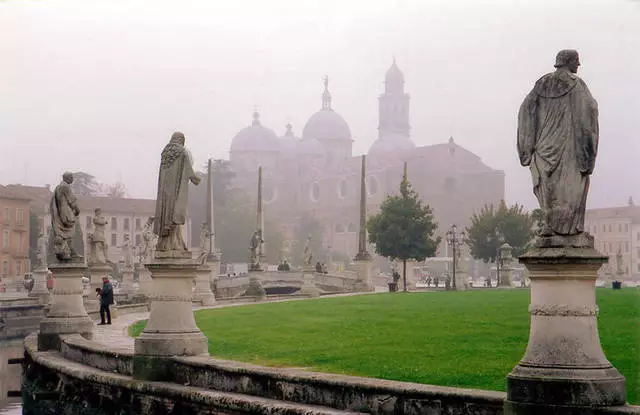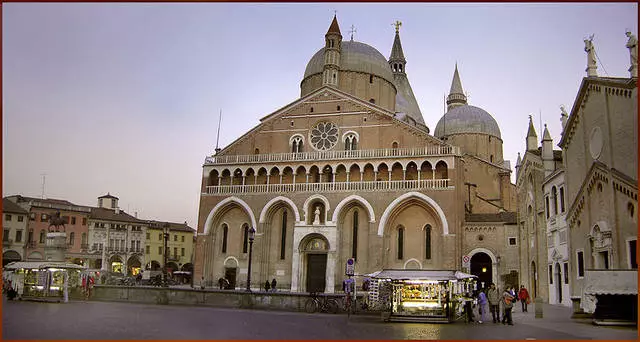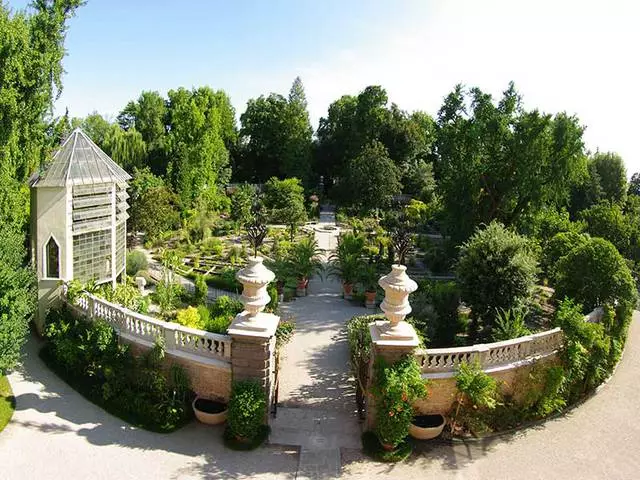Padova is a relatively small ancient town in the Veneto region. According to our standards, the city is really not very big - its population is only about two hundred thousand residents, but by the standards of Italy, it can be called an average city.
So let's deal with whether it is worth going to Padua, if so, with what goals, if not, then why. In addition, I will try to give a brief overview of this city to make you clearer what to expect from him.
Padua partly undeservedly moved to the side, because most of the tourists prefers to visit Rome, Milan, Venice, Verona and Pisa, because these names for hearing everyone and everyone knows that you can expect from these cities and why it is worth going there - Venice is famous for Channels, Verona - an excellent city for a romantic leisure, where much resembles the immortal work of Shakespeare, Pisa attracts tourists with a famous falling tower. Padova is a city of no less ancient and no less attractive in terms of history than all of the above places. It was founded even in the Roman era, during the Middle Ages, he was a prosperous university city (the University of Padua was founded in 1222), so you can see monuments of different eras.

So, the first reason why go to Padua is Huge number of historical attractions (Just below, I will conduct a brief overview). In this regard, I would like to note that, of course, Padova is attractive for lovers of cultural recreation, since it does not have access to the sea, so there is no speech about the beach rest. Those who prefer sightseeing or independent sightseeing, first of all, should turn their attention to the historic center of the city, which is very well preserved to our times. It is surrounded by walls built in the 16th century.

The center of the city is considered Grace herbs and Fruit Square (There since ancient times there is a market). Between the squares is a magnificent palace called Palazzo della Razhion. Nearby is also located and Palazzo del Municipio. In walking distance, you can see and Cathedral The construction of which was delayed in a few centuries. There you can admire the magnificent frescoes. The city has several churches that are worth paying attention to them. You can, first of all, the Church of St. Anthony of Paduansky, who strives for its size and truly is a real treasury - there you can take a look at the stone bas-reliefs, and on the bronze candelabrier and on the frescoes of the famous artists. In the city center is and Botanical Garden (He is the oldest in the world !!), which is called the prototype of all botanical gardens in the world.

As you understood from all over the above, Padova is the most real open-air museum, where lovers of history will be able to fully enjoy the magnificent monuments of the antiquity. To the undoubted advantages of Padua, I will take a fairly compact location of all these objects - all of them are located in the city center, so you can quite walk on foot, so you don't even need a car, especially since there are not so many parking lots in Padua, but Streets, as in any ancient town, are very narrow. There are quite a few pointers in the city, so you don't get lost - the path to all tourist objects will be equipped with signs.
The second reason to be in this city - Excellent transport accessibility . Many tourists include in its trip to Italy inspection of Venice, and from Venice to Padua can be reached by train just half an hour if you use the local train, and for ten - fifteen minutes, if you go to Eurostar (a ticket, of course, will be more expensive ). Thus, to visit Padua, you do not have to deviate far from the generally accepted tourist route and travel to the wilderness - half an hour and you are already there.
The third reason is directly related to the relatively small fame of Padua among tourists (I mean regarding cities such as Rome, Venice, Milan, Florence and Pisa). As you all know, Italy is very visited by tourists, so in many cities they walk through the streets just the crowds of the people, which is sometimes annoying fans of a quieter rest. In Padua, tourists, of course, are, but they are not so much, as in larger cities, so there are no queues on the entrance to the museums and the church, cafe is not clogged by visitors, and in the street you can always walk in the street, and not to pusary among tourist masses. For those who prefer Calm rest This is an indisputable plus. Moreover, in the city is very clean (especially if you compare it with Rome, where heaps of garbage can lie right on the street). During your stay there, we did not see any garbage and dirt on the streets, even when I slightly moved away from the historic center. Including therefore from the city there were very nice impressions.
And one more positive moment is safety . In Padua, much more safely than in larger cities, of course, and there we must follow your things, but no matter how cool, there is no such number of pockets, such as in the capital.
As you already understood, pluses in Padua quite a lot, but now a little about the minuses:
TO Minusam This city can be attributed No entertainment - Some kind of disco, noisy bars and parties. Of course, there is a pair of nightclubs, but fans of stormy nightlife Padua hardly will like to taste.
And in conclusion a few words about my vacation in Padua - we were in the city pass from Venice and stopped there for one full day and one evening. The city remained the most pleasant impressions - there is a spirit of antiquity, some elusive local flavor, a very pleasant to walk on the streets, the locals also pleased - in Padua no one hurries anywhere, so any passer-by will explain to you how to go to the place you need . We inspected all the main sights in one day, because the city is small, so in my opinion, the optimal time of stay in Padua is one to two days, otherwise you risk bother.
